Private First Class Raymond Jubera, U.S. Marine Corps – A City Boy Helps Make History
To some, it seems our lives are pre-ordained. They believe where we are from and whether our parents are rich or poor may well determine how we will turn out in life. Private First Class Raymond Jubera didn’t believe that. Instead of letting life control him, he took control of his life and was “all in” with the decisions he made. As a result, he participated in history rather than just reading about it in a newspaper. This is his story.
Ray’s grandfather immigrated from Mexico and made his way north until he settled in Dassel, Minnesota, where he worked on sugar beet farms. When his sons were old enough, they worked on the farms, too. However, Ray’s father tired of the farms and moved to Chicago in search of greater opportunity. There he found a job at a factory, got married to Ray’s mother who had moved to Chicago from Texas, and started a family.
Ray was born in July 1955 and had three brothers and three sisters. Although both his father and mother worked, they only earned enough money to put food on the table and a roof over their heads. Still, the family was close-knit, and the kids had fun playing baseball and football in the streets out in front of their home.
As Ray grew older, the neighborhood grew tougher and more dangerous. The public schools were integrating and racial tensions were high. The schools struggled to deal with the issues, making learning difficult for the students. Frustrated, many of Ray’s peers dropped out. Ray was frustrated, too, but he wanted to graduate from high school. He knew, though, that wasn’t going to happen if he stayed in Chicago, so he took the extraordinary step of asking his aunt and uncle in Minneapolis, Minnesota, if he could come to live with them and finish high school there. When they agreed, he said goodbye to his family and headed north in the summer of 1973 to start his senior year of high school at a new school.
Roosevelt High School in Minneapolis was everything Ray dreamed a high school should be, like something out of a movie. Instead of the bare minimums in everything Ray had grown accustomed to at his school in Chicago, he found sports teams and activities aplenty. Unfortunately, because he had to catch up on some missing credits to graduate on time, he couldn’t take advantage of any of them. While other seniors were able to go home early because they already had the credits they needed to graduate, Ray attended school each day from start to finish. He also attended classes two nights a week and, as if that schedule wasn’t rigorous enough, worked on the off nights and on weekends at a Sears shipping and receiving center.
Ray’s hard work paid off when he graduated from Roosevelt High School in June 1974, the first of his family to earn his high school diploma. Grateful to his aunt and uncle for having taken him in but not wanting to impose further, he moved in with his cousin. The move was a package deal because his cousin’s husband managed a landscaping company and Ray started to work for the company laying sod. He also flirted with attending the University of Minnesota in the fall, but college was not his top option because his family had always emphasized hard work rather than the luxury of a college education.
One option his family did have experience with was military service. Ray’s father fought in the Korean War and one of his uncles on his mother’s side served in World War II. Even closer, Ray’s older brother, Ruben, had joined the Marines and was currently on active duty. Ray looked up to Ruben, who was a year-and-a-half older than him. He also admired the Marines, which he considered the most elite U.S. military service. Above all, Ray loved the United States and all that it stands for. Accordingly, when the summer of 1974 landscaping season ended, Ray visited a Marine Corps recruiter and enlisted for two years.
Ray reported for active duty on September 19, 1974. He flew from Minneapolis to San Diego, California, to attend boot camp at Marine Corps Recruit Depot (MCRD) San Diego. The expected yelling started as soon as the sergeants met the newly arriving recruits at the airport. “Get on the bus, get on the bus!” they shouted. The busload of recruits arrived at MCRD San Diego around 2:30 a.m. The initiation began immediately with the recruits marching to the barbers, who were waiting with clippers in hand to shave everyone’s head. Ray and the other recruits started laughing at the change, all having arrived just minutes before with shoulder length hair and now all were essentially bald. The sergeants brought the laughter to an abrupt end, ordering the recruits to line up and stand at attention. Anyone who so much as flinched brought the ire of a drill sergeant down on them and pushups until their arms could do no more. Ray and the other recruits learned quickly if they were going to make it through boot camp, they had to follow orders to the letter.
The physical training at boot camp proved Ray’s biggest challenge. When he lived in Chicago with his parents, he was known as “Little Ray”, measuring in at 5’7”, 160 pounds. In Minneapolis during his senior year, he grew two inches and gained a lot of weight eating his aunt’s abundant cooking. Now one drill sergeant made it his personal mission to get Ray in fighting shape, pushing him with extra exercise. When the platoon waited in line for chow, stopped by the administrative offices to get paperwork done, or visited the clinic to get their medical checks, the drill sergeants had Ray and the other recruits doing pushups, squat thrusts, and other exercises until they were exhausted. Early on before Ray could see how fit he was becoming, he started to wonder whether he had made a mistake by enlisting in the Marines.
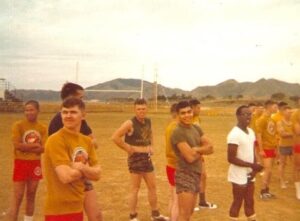
Soon, the constant exercise and the drill sergeant’s extra attention proved Ray had not made a mistake. Upon first arriving, he took his initial physical fitness (PT) test, running three miles in twenty-eight minutes, doing ten pullups, and completing forty sit-ups in two minutes. At his final PT test, Ray completed the run in just seventeen minutes, did thirteen pullups and over sixty sit-ups. Twelve weeks of boot camp enabled him to get into the best shape of his life and he was proud of his accomplishment. Later in life he would run two Chicago Marathons, something he is sure would not have been possible without his Marine Corps training instilling in him the commitment to never give up.
Some of Ray’s training, including M16 rifle training, occurred at Camp Pendleton, located about forty miles north of San Diego. There Ray observed newly minted Marines continuing their training after having graduated from boot camp. They looked sharp in their uniforms and marched with such precision that they inspired Ray to work hard at everything he did so he could one day join their ranks. Back at MCRD San Diego, he also watched planes take off from nearby San Diego International Airport and looked forward to the day when he would be a new Marine onboard one of those flights heading to his first permanent duty station.
Graduation day finally arrived shortly before Christmas in 1974. Having successfully completed the arduous three-month ordeal, including qualifying as a Sharpshooter with the M16 rifle, Ray had earned the privilege of being called a Marine. Not everyone who started boot camp with him made it to the finish line. Of the eighty-five original members in his training platoon, only about sixty graduated. Those who didn’t make it dropped out for a variety of reasons, including not being able to meet the physical standards, medical issues, and having a bad attitude. Ray was both relieved and proud to learn he had what it takes to be a Marine.
Because Ray enlisted for just two years, there was never any doubt what his MOS (Military Occupational Specialty) would be – infantry. Other MOS’s required additional training, but a two-year enlistment offered insufficient time for the Marine Corps to train a new Marine and then recoup its investment. For Ray, that meant a month of follow-on infantry training at Camp Pendleton, where he would now be one of the polished new Marines being observed by recruits training at the rifle range. The infantry training involved learning small unit tactics in the field, including live-fire weapons training. It also meant getting to experience liberty off base for the first time and enjoying time at the on-base Enlisted Club.
Upon completion of infantry training, Ray received orders to his first operational unit, Alpha Company of the 1st Battalion, 4th Marines (1/4 Marines), located on Okinawa, Japan. Now it was his turn to board a plane some other recruit at MCRD San Diego might be watching take off. Once he arrived on Okinawa, he was assigned as a rifleman with Alpha Company’s 2nd Platoon. He could not believe things had happened so quickly. He had graduated from high school in June 1974 and now, less than a year later, he was an eighteen-year-old city boy from Chicago stationed halfway around the world on the historic island of Okinawa.
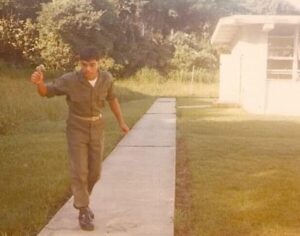
Ray’s first goal upon arrival was to fit into his platoon. Everyone else in the platoon had been together for over three months, so Ray didn’t know anyone and had to earn everyone’s trust. He started by making friends with another Marine from Chicago. His circle of friends grew from there as he spent time training with his unit. That training came to an end in April 1975 when Ray’s company commander told his Marines to pack their gear and prepare to go to war.
The situation was dire, indeed. South Vietnam had been able to hold out against North Vietnamese attacks after the United States ceased military operations in South Vietnam in March 1973. However, by mid-April 1975, the North Vietnamese Army was approaching the outskirts of Saigon and preparing for the final assault. Having waited too long to order an evacuation of the remaining U.S. citizens from South Vietnam and the closure of the U.S. Embassy, the U.S. government began to position Navy ships off the coast to facilitate the rescue of U.S. citizens. Far more challenging was the need to extract South Vietnamese citizens who had been loyal to the United States throughout the Vietnam War. Given the North Vietnamese massacre of thousands of South Vietnamese citizens in Hue during the Tet Offensive in 1968, all South Vietnamese citizens who had assisted the United States faced uncertain futures if left behind. Consequently, they and those Americans they worked for pleaded with the U.S. government to help them escape.
This is where Ray and the rest of Alpha Company entered the picture. Loaded for combat as part of Operation Frequent Wind, they boarded a U.S. Navy ship to help conduct the rescue operation in mid-April. Once they arrived off the coast of South Vietnam, Ray recalls several times embarking helicopters in full combat gear and heading for shore, only to do a U-turn and return to the ship or another ship without action. The ships sailed close enough to shore that Ray could see the beach and even hear mortar rounds blowing up in the sand. Then junks, sampans, and other small boats laden with South Vietnamese refugees started to make their way out to the ships. Not knowing what to expect, Ray and his fellow Marines were posted around the main deck of their ship to provide security in the event something bad transpired when the refugees were brought aboard. Fortunately, all the rescues were peaceful, but Ray had to be ready in case anything happened.
Initially, only a few refugee boats made their way to Ray’s ship. Once they came alongside, they boarded the ship from a ladder with a platform near the water providing access to the main deck. All the refugees, including men, women, and children, were brought aboard, processed, and provided food and shelter. When it became clear ashore the small boats offered a way to reach the Navy ships and the ships were taking refugees onboard, the flow of refugee boats increased exponentially. Each ship took onboard as many refugees as possible, then departed to offload them onto another ship or at the U.S. Navy bases at Subic Bay in the Republic of the Philippines and Guam. Before their ship departed, Ray and Alpha Company would transfer to another ship to provide security so it could take the departing ship’s place in picking up refugees. Ray remembers serving aboard several ships during the rescue operation, including the USS Blue Ridge (LCC-19) and the USS Duluth (LPD-6).
Although Alpha Company’s role in the final chapter of the Vietnam War ended with the conclusion of the evacuation of South Vietnamese refugees, Delta Company of the 1/4 Marines still had a role to play. On May 15, 1975, Delta Company successfully boarded and recaptured the SS Mayaguez after it had been seized by Khmer Rouge forces just three days before. Other Marine and Air Force units simultaneously fought a heated battle with the Khmer Rouge on Koh Tang Island off the coast of Cambodia, withdrawing from the island by the end of the day after sustaining heavy casualties.
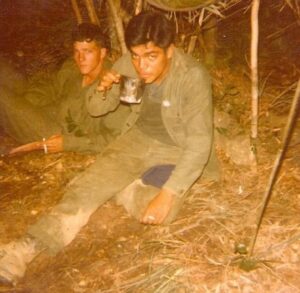
After completing the evacuation operations, Ray and Alpha Company were transported by ship to Subic Bay. They trained at the Marine Amphibious Unit (MAU) Camp known as Upper MAU, where they learned and practiced jungle warfare tactics. This included conducting patrols in the jungle with all their gear, participating in exercises where they had to successfully navigate between points on a map, and engaging in exercises with other units playing roles as adversary forces.
One day as Ray was waiting in line at the Upper Mau chow hall, a Marine attached to an aviation unit exited the facility and saw Ray waiting in line. After seeing Ray’s name tag, he went back inside and re-emerged a few moments later with Ray’s brother, Ruben! It was an emotional reunion as Ray hadn’t seen his brother in two years. After they embraced and got over their astonishment at having run into one another, Ruben told Ray he had a plan. He told Ray to put in a request to his company commander for a three-day pass, explaining he had just run into his brother. Ruben would do the same thing. Ray did as instructed and unbelievably, Ray’s company commander approved the request even though Alpha Company was still technically on standby in the event they were needed again for events in Vietnam. The brothers spent three days in Manila and had the time of their lives, with both returning to their respective units rejuvenated.
After completing their initial jungle warfare training, Alpha Company’s commander informed the company they would be embarking a ship to go on a cruise. He told them there were two kinds of cruises, “training floats” where the unit trained at various places throughout the cruise, and “liberty floats” where the ship visited various foreign ports and the Marines got to enjoy liberty ashore. This cruise, he was happy to report, was a liberty float. That meant their sole mission was to serve as goodwill ambassadors for the Marine Corps and the United States ashore. This they did and Ray took full advantage of port visits in Hong Kong, Singapore, Taiwan, and Malaysia. He especially enjoyed touring the countries and learning as much as he could about their people, culture, and food during their seven-day visits to each location.
Alpha Company returned to Subic Bay and Upper Mau at the conclusion of the liberty float to continue their jungle warfare training. Then around September 1975, the unit returned to Okinawa to formally end its deployment. At this point, many Alpha Company personnel, including the commanding officer, reached the end of their tours and transferred to other units. Ray’s orders ran through January 1976, which now worked to his advantage through another coincidence with his brother.
Learning Ray was back in Okinawa, Ruben reached out to him and suggested another meeting because he was now at the Marine Corps Air Station in Iwakuni, Japan. He again told Ray to put in a request to his company commander for a three-day pass, explaining Ruben was in Iwakuni and this would be the last time they would be able to see one another since Ruben was getting ready to transfer back to the United States. Ray’s new company commander approved the request, perhaps not aware of Ray’s similar three-day pass in the Philippines. Ruben’s commanding officer did the same, and thanks to tickets Ruben was able to obtain, the brothers attended Expo ’75, a World’s Fair that just happened to be occurring on Okinawa during the second half of 1975.
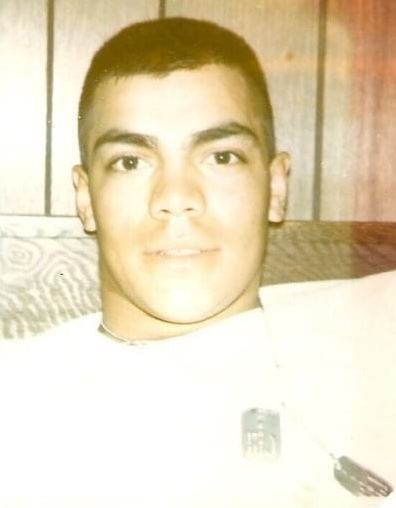
Ray’s tour with Alpha Company of the 1/4 Marines came to an end in January 1976. He returned to Camp Pendleton in California and was assigned to a platoon with other Marines who had less than a year of their enlistments left. He served out his remaining time performing guard duty at the armory and at other facilities around the camp requiring heightened security. During this time, some high school buddies he hadn’t seen in three years visited him from Chicago. Ray gave them a tour of the base and they had a great time together, but they simply could not relate to Ray’s decision to become a Marine. Ray, on the other hand, could not imagine his life without his Marine Corps experience. He’d seen and done things other people only dream about and his service gave him discipline and pride. He marveled at how a city boy like him had gotten to play a role in world events like the evacuation of refugees from Vietnam after the fall of Saigon.
Despite loving his time in the Marines, Ray decided not to reenlist because he wanted to return home to his family and friends. Accordingly, he received his honorable discharge from the Marines on September 1, 1976, after two years of dedicated service. By yet another coincidence, Ruben received his honorable discharge on the same day in Millington, Tennessee. At Ruben’s suggestion, Ray flew to Memphis and met up with Ruben. The two then drove to Chicago and rented an apartment together. Ray used his GI Bill to attend school and earn a certificate in law enforcement, while Ruben decided to move to Minnesota to be with their family, which had moved back there after Ray joined the Marines.
Now on his own, Ray accepted a job as a security guard at the Norwegian American Hospital in Chicago. Not only did he work there for thirteen years, but he also met his wife, Rose, there and they have been married forty-three years and counting. Ray eventually left the Norwegian American Hospital in 1991 to work for the Aviation Police at O’Hare International Airport. He stayed there for twenty-seven years, retiring as a lieutenant in June 2018. Ray and Rose are now enjoying retirement together in Chicago, spending time with their three children, eight grandchildren, and three great-grandchildren. Finally, Ray participated in an Honor Flight to visit Washington DC in September 2023 in recognition of his service to our country in the Marine Corps.
Voices to Veterans is proud to salute Private First Class Raymond Jubera for his exemplary service in the Marine Corps. His service took him to the waters off the coast of South Vietnam, where he provided security for U.S. Navy ships helping South Vietnamese refugees escape from the conquering North Vietnamese army. After the Marines, he continued a life of public service through a long career in law enforcement. We thank him for all he has done and wish him fair winds and following seas.
If you enjoyed Ray’s story, please sign up for the Voices to Veterans Spotlight monthly newsletter by clicking here. Once each month, you’ll receive a new written veteran’s story directly in your mailbox. Best of all, it’s free and you can unsubscribe at any time.
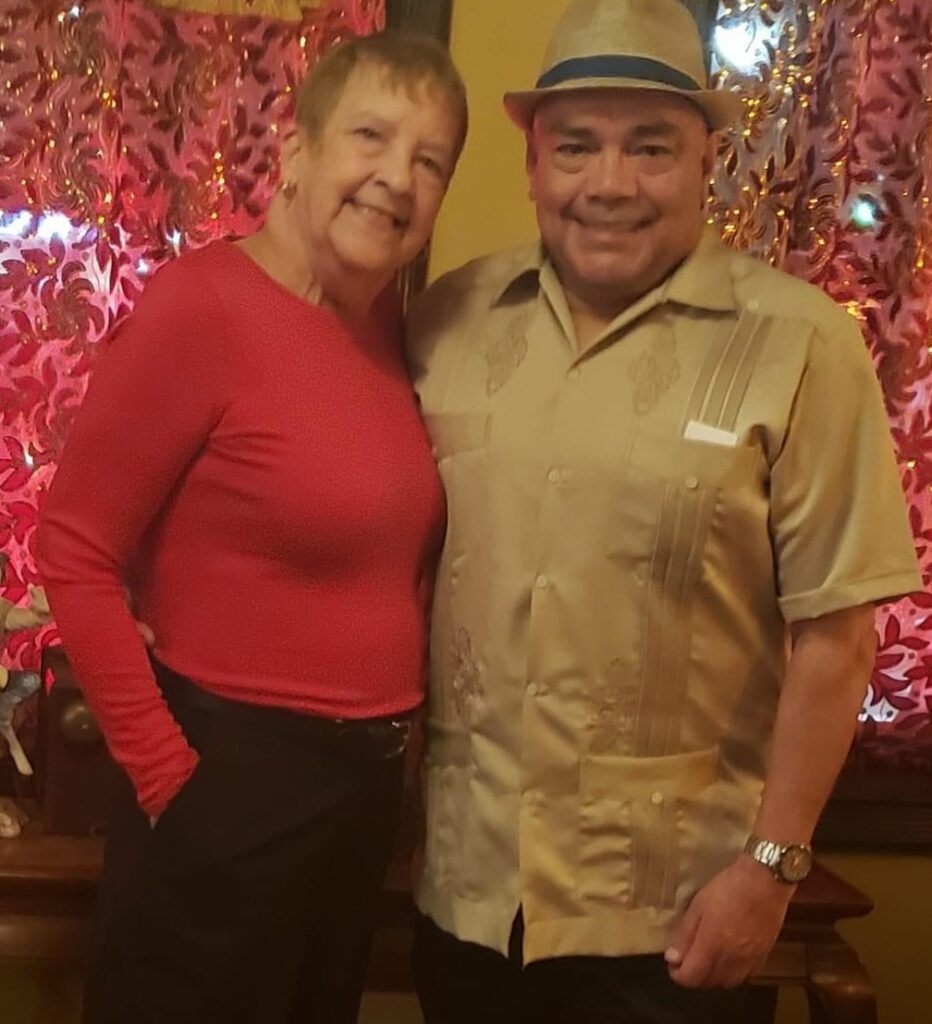

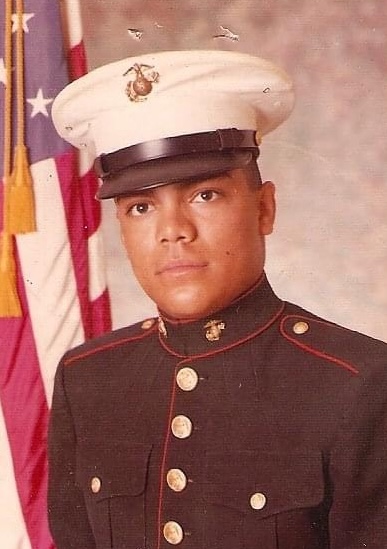
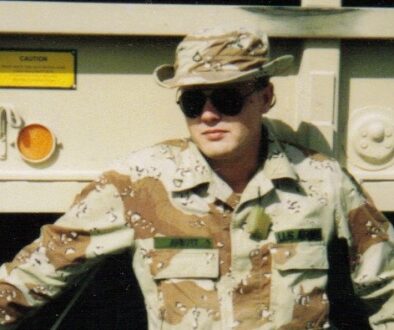
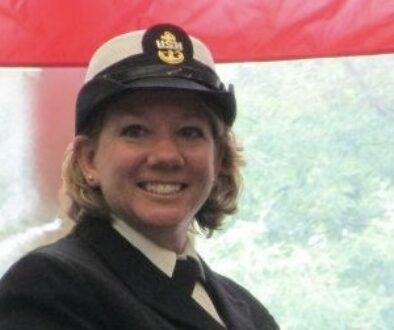
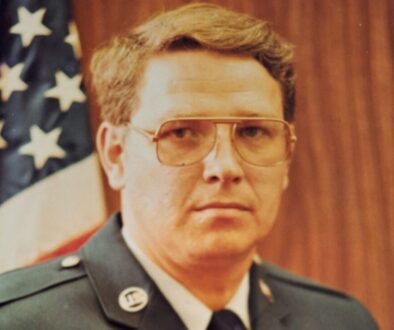
July 19, 2024 @ 4:13 AM
So proud of both of our Jubera-Gonzales cousin’s service to our country.
July 19, 2024 @ 9:57 AM
Pauline – Thanks for taking the time to read Ray’s story!
V/r,
Dave Grogan